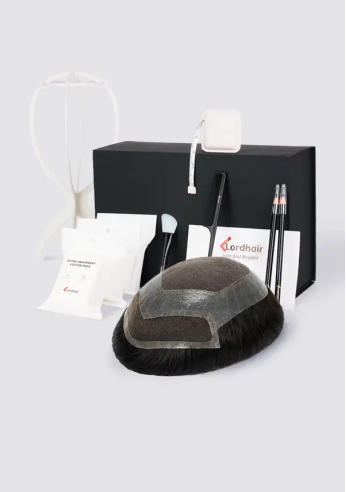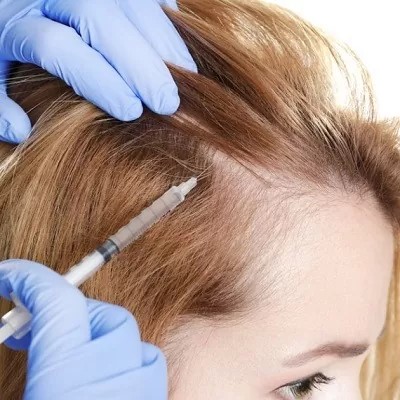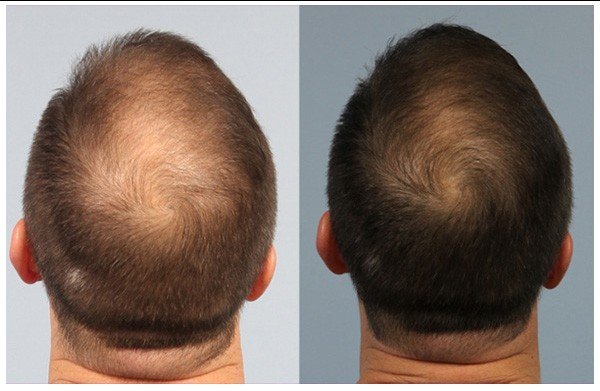Can Anesthesia Cause Hair Loss?
Surgery is a major event that affects bodily functions in many ways. Some people discover unexpected hair loss as a side effect of the recovery process. Post-surgical hair loss is frequently attributed to anesthesia, combining surgical stressors such as medications and altered blood circulation induces excessive hair loss.

People who experience hair loss whether it lasts for a short period or becomes permanent consider restoring their appearance their main concern. This is why Lordhair provides premium hairpieces to deliver a quick solution that looks completely natural. In this blog, we will discuss anesthesia and hair loss, Let’s dive in!

Hair Loss And Anaesthesia
Telogen effluvium is typically responsible for hair loss that occurs after surgical procedures. Telogen effluvium happens when multiple follicles prematurely enter the resting stage of their growth cycle, leading to heightened shedding. The human hair cycle consists of three main phases:
●The anagen phase represents the active growth stage which persists across multiple years.
●During the catagen phase, growth ceases.
●The telogen phase represents the resting period that ends when old hairs fall out to allow new growth.
The body experiences more follicles moving into the telogen phase during significant stress events like surgery or illness. Noticeable shedding typically occurs within a one to three-month period following surgical procedures. Anaesthesia does not cause hair loss directly but it disrupts bodily functions which leads to temporary shedding. Surgical procedures combined with anesthesia contribute to hair loss by triggering factors that push the follicles into the telogen phase.
Several factors related to surgery can trigger telogen effluvium, making hair loss more noticeable after medical procedures:
Physical Stress on the Body
The physical stress from surgery activates the immune system and directs energy towards healing processes. Non-essential bodily activities like hair growth experience temporary interruptions due to these disruptions. After surgery, the body focuses its resources on vital organs instead of the follicles causing more shedding during the following weeks or months.
Reduced Blood Circulation to the Scalp
General anaesthesia leads to decreased circulation throughout the body which includes reduced blood flow to the scalp. Healthy follicles need a continuous delivery of oxygen and nutrients. Blood flow disruptions result in weakened follicles which leads to premature shedding.
Hormonal Fluctuations
The combination of surgery and anesthetic exposure initiates hormonal shifts which prominently affect cortisol levels in the body. Increased cortisol levels speed up hair loss while extending the telogen phase and postponing new growth.
Side Effects of Medication
Hair loss can occur as a result of taking post-operative medications including antibiotics as well as pain and anti-inflammatory drugs. Certain drugs disrupt the normal growth cycle which results in temporary increased shedding.
Nutritional Deficiencies After Surgery
The healing process after surgery demands extra nutrients both for wound repair and energy restoration in the body. Specific people might face deficiencies in essential nutrients like iron, biotin, and zinc that play a vital role in maintaining healthy locks. When the body lacks these essential nutrients, follicles grow weaker which results in shedding.
How Long Will Hair Loss Last After Surgery?
Hair loss that occurs because of anesthesia and surgical procedures typically resolves over time. After surgery, shedding becomes apparent within one to three months but improves gradually over six to twelve months when the follicles resume their typical growth patterns.
Each person experiences a different recovery timeline after surgery. Patients who already suffer from pattern baldness (androgenetic alopecia) might experience faster hair loss after surgery which can slow down or prevent complete regrowth. When shedding continues beyond one year or new growth remains insufficient, one should seek dermatological evaluation to identify conditions such as chronic telogen effluvium and other alopecia types.
How to Minimize Hair Loss After Surgery
Hair loss after surgery is sometimes unavoidable but certain measures exist that help maintain healthy follicles while minimizing excessive shedding.
Follow a Balanced Diet
The consumption of nutrient-dense foods designed to boost growth remains essential throughout recovery periods. Consume protein-packed foods along with iron-rich options, omega-3 fatty acid sources, and biotin-containing items like eggs, fish, nuts, and leafy greens. Consider taking supplements when needed but seek professional healthcare advice before starting them.
Stay Hydrated
The body relies on water to ensure proper circulation and nutrient transport to the follicles. Adequate hydration helps maintain scalp health while encouraging recovery.
Use Gentle Care Products
Steer clear of harsh shampoos and excessive heat styling and avoid tight hairstyles to prevent additional strain on the scalp. Choose sulfate-free shampoos together with hydrating conditioners to keep your scalp moisturized and minimize breakage.
Manage Stress Levels
Deep breathing exercises alongside meditation and light physical activity can help handle stress while boosting their general health.
Consult a Specialist
Consulting with a trichologist or dermatologist for advice on hair loss that continues longer than usual can identify if treatments like minoxidil, PRP therapy, or low-level laser therapy are suitable for regrowth support.
The Best Solution for Hair Loss
Hair typically returns after surgery but the wait for recovery can be disheartening for those whose self-esteem depends on their appearance. Lordhair’s premium hairpieces deliver immediate natural-looking results without months of waiting or costly treatments. The hairpieces integrate flawlessly with natural locks to deliver a perfect appearance.
Neo Pack
Experience the Neo hairpiece, combining superior breathability, easy attachment, and low-maintenance care. With optional clips, it attaches securely without shaving the bonding area, delivering a natural, comfortable look for every head shape and hair type. This set includes all the essential items needed to successfully attach your first hairpiece.
Custom Laura
Women’s integration wig for ladies with thinning locks, with small hole PN integration and PE line integration at the back.
Final Note
Surgical procedures can lead to temporary hair loss because the body's stress response decreases blood circulation and hormonal fluctuations can cause this condition. The shedding phase usually lasts several months but growth resumes with bodily recovery. A balanced diet alongside stress management and gentle care products aids in supporting regrowth. Lordhair's premium hairpieces deliver immediate results by restoring confidence and providing a natural full-haired appearance without the need to wait months.
 Don't let your content be flagged with AI Detectors - use a Free AI Humanizer
Don't let your content be flagged with AI Detectors - use a Free AI Humanizer
 Don't let your content be flagged with AI Detectors - use a Free AI Humanizer
Don't let your content be flagged with AI Detectors - use a Free AI Humanizer
















